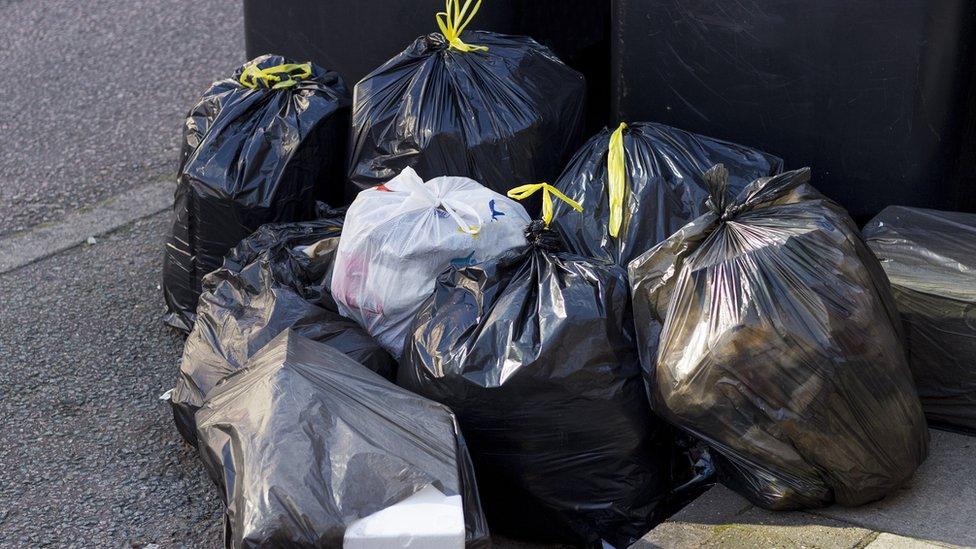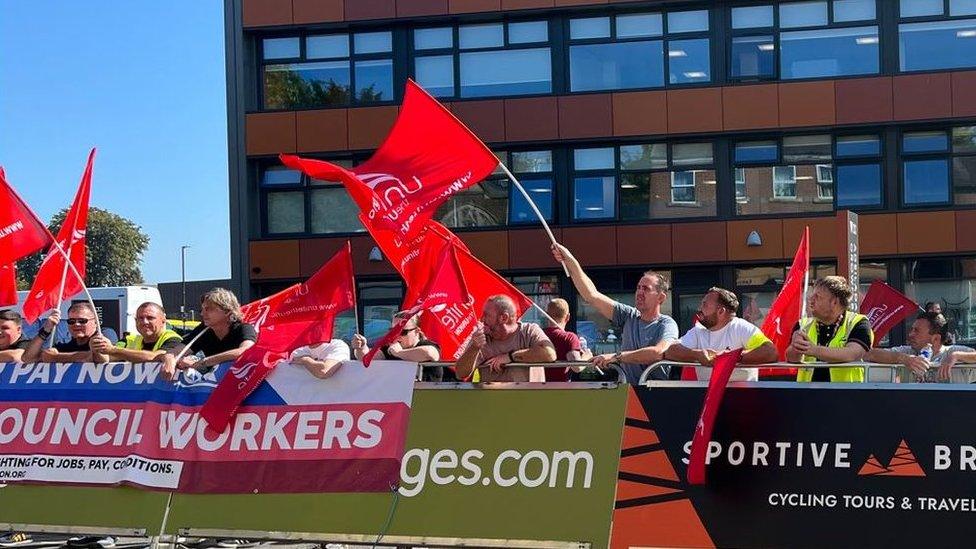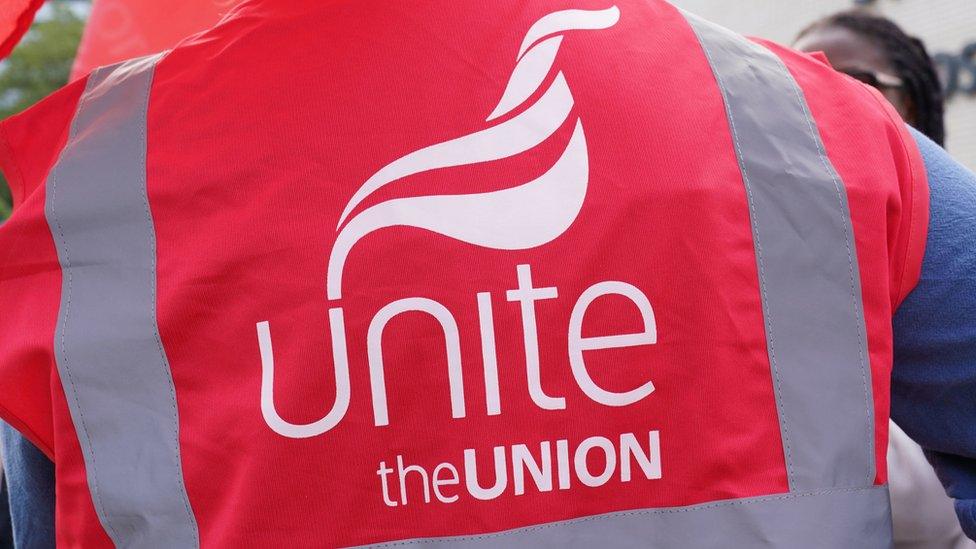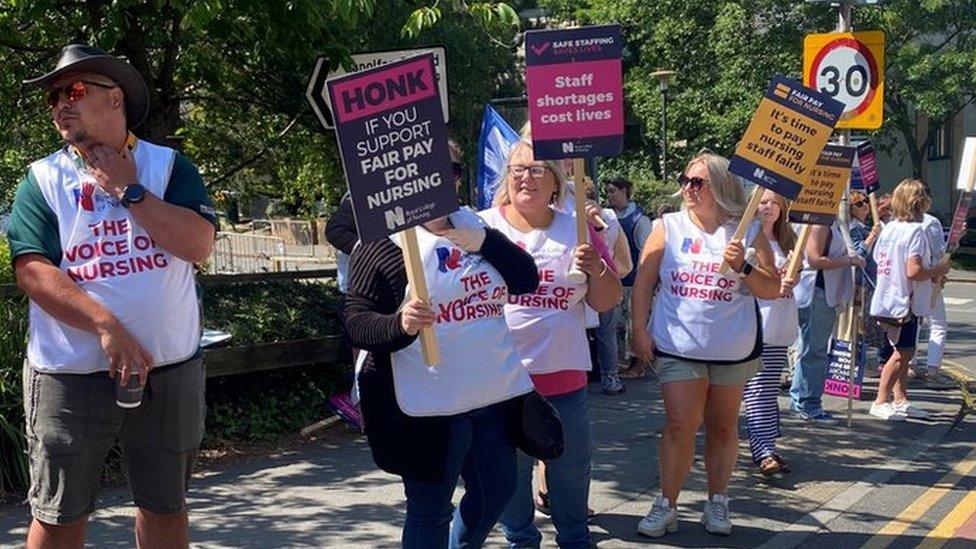Council strikes: Cardiff and Wrexham bin collections could be hit
- Published
- comments

Bin collections could be disrupted in certain areas of Wales due to the strike action
People in Cardiff and Wrexham have been warned that their bin collections could be disrupted by a two-week strike, which begins on Monday.
The Unite union is coordinating a campaign of industrial action from 4 September, across 23 councils in England and Wales, over a pay dispute.
Unite members at Gwynedd's council will also strike for a week from 11 September.
Cardiff council advised residents to check its website for daily updates, external.
Cardiff bin collection
It said black bin and food waste collections in the Welsh capital were "expected to continue as normal" but cancellations might be necessary for garden waste and recycling.
It said the collection of hygiene waste could also be suspended, but added that it could be put out alongside black bins or black bags on the scheduled fortnightly collection day.
Cardiff's Lamby Way recycling centre is expected to operate as normal but the Bessemer Road site will be closed to domestic users.
Wrexham bin collection

Wrexham council workers are at the picket line
In Wrexham, the three civic amenity sites are expected to be unaffected by the industrial action.
It is unclear how much impact the strikes will have on council services, but schools will not be affected.
Most Unite members work in refuse collection, so that is where disruption is expected.
But Wrexham council said the full impact would not be known until the strikes got under way.
It has asked people to put out their bins and recycling as normal , externaland said it would respond to the situation as it unfolds.
Ian Bancroft, Wrexham council's chief executive, said: "We've been trying to assess the potential impact and will make every effort to minimise disruption for local people.
"However, in many cases we won't really know the full impact until the day of the strikes."
Why are council workers striking?
Unite said it was calling the strikes after the body which negotiates on pay for council workers in Wales, England and Northern Ireland refused to reopen talks.
The National Joint Council (NJC) for Local Government Services said the pay offer for 2023-24 - of £1,925 for those earning less than £49,950 and 3.88% for higher earners - was "full and final".
But Peter Hughes, the regional secretary for Unite Wales, said the current pay offer was "a slap in the face and would see pay levels further eroded".
"Our members provide essential services day in, day out, and deserve better," he added.
The NJC defended the offer as "fair in the circumstances" and said it equated to "an increase for the lowest paid of 9.42% this year; meaning their pay will have increased by £4,033 (22%) over the two years since April 2021".
The Welsh Local Government Association said it was "open to co-ordinating conversations between trade unions and all 22 local authorities regarding pay-related issues" if they adhered to "standard procedure".
"Our commitment lies in collaborating wholeheartedly with the unions in fostering social partnership. We aim to ensure that any negotiations uphold the robust principles and coordinated strategies that have proven successful over the course of several years," it said.
Why aren't all council areas affected?
The reason that strike action is only taking place at 23 councils across Wales and England is because of the law around turnout thresholds.
When a union holds a ballot, it's not enough to get a majority in favour of industrial action, it must also get more than half its members to vote in that ballot.
Where local authorities are involved, because each one is a separate employer, the law requires you to hit that threshold at each council.
The councils where that has been achieved are involved in this month's action.
It is understood that some other councils came only marginally below the 50% threshold so Unite may consider re-balloting if the dispute is not resolved.

ONE MAN AND HIS ISLAND: What's life like for Flat Holm Island’s newest warden?
YR WYDDFA: Life on Britain's busiest mountain

- Published24 August 2023

- Published1 September 2023
